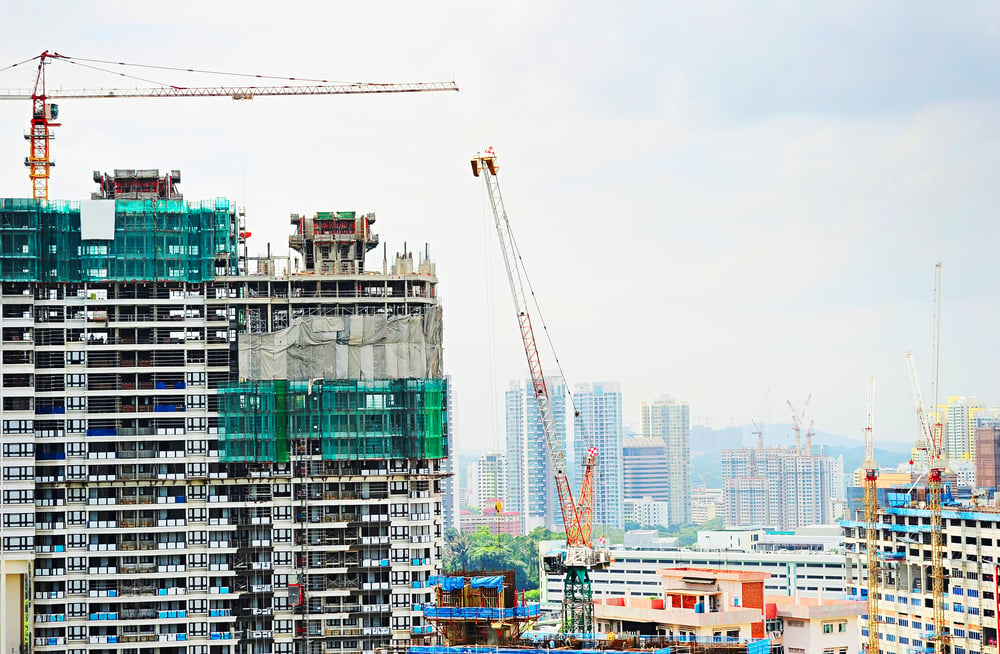The rental market has been pretty robust for the past several months. Rents for condo and HDB flats rose by 1.3% in April even as volumes decreased. In fact, condo rents have been increasing for four straight months. In the meantime, HDB rents have gone up for the tenth consecutive month.
But with Phase 2 (Heightened Alert) happening, there’s some concern that it will affect the rental market. Despite the latest movement restrictions until 13 June (fingers crossed), we think it’s not going to slow down the rental market. Here’s why.
Construction delays
One main cause of the recent rental surge is that buyers are expecting longer delays in the completion of their homes.
In early April, the Ministry of National Development (MND) announced that 85% of 89 BTO projects have been delayed for up to six to nine months due to labour and supply shortages.
And it’s not just BTO projects that are facing delays. Various construction projects including private residential, commercial and industrial projects are facing the same issue too.
Then came the restrictions on visitors and long-term pass holders coming from India, Bangladesh, Nepal, Pakistan and Sri Lanka. India and Bangladesh are also where most of the construction workers are from. So buyers will have to expect an additional waiting time of three months for their homes.

The longer delays will drive more people to go for rental housing, especially for those who can no longer live with their families and need an alternative accommodation.
Low supply of interim rental housing
For those currently waiting for their BTO and face difficulties finding an alternative accommodation, they can apply for interim rental housing such as the Parenthood Provisional Housing Scheme (PPHS).
On the other hand, supply for PPHS flats is limited, with HDB offering only 160 flats under the scheme last year. Due to the construction delays, HDB saw demand for the flats nearly double as it received 2,350 applications in 2020. This was nearly twice of the 1,370 applications received in 2019.
Since the success rate of applying for interim rental housing with HDB is very low, we can expect more people turning to the open rental market while they wait for their BTO to be completed.
More people moving out due to WFH
Now that work-from-home is the default again, people are spending more time at home. And for some, it can be a challenge when there’s more than one person in the household working from home.
(Like whenever your father/mother/brother/sister/spouse/partner has a scheduled call at the same time as you, isn’t it frustrating when you’re already comfortable in your spot, but have to carry your laptop and relocate to another room for the call? And if you’re required to switch on your camera during the call, you still have to do some setting up to hide your messy house or room to get a decent background.)
As people crave for more space and privacy, the stay-home arrangement may prompt more to move out.
High property prices
We’re not just seeing a surge in rents, but also property prices for both resale HDB flats and condos. In fact, HDB resale flat prices have been on the rise for the tenth consecutive month. Likewise, prices of resale condos have been steadily increasing for several months.
With more flats being sold above valuation, the cost of buying a resale flat now can be too high for some. For those who can’t wait any longer, instead of buying resale, they turn to the rental market while they wait for the price to drop.
People are still arriving from overseas
Currently, Singapore is not accepting new entry applications for work pass holders from higher-risk countries to curb the spread of Covid-19.
Despite the various border restrictions in place, citizens, PRs, long-term pass holders and students are still arriving. There are also professionals and dependents, especially from the lower-risk countries, that are coming in.
This group of people may look for rental housing first as they settle down, propping up the rental market.
Low rental supply
Right now, there’s a high occupancy rate as people renew their leases. This can be due to their houses being still under construction. Foreign professionals may also be extending their stay here due to the travel restrictions.
On top of that, construction delays have reduced the number of new homes available for rent.
Availability of digital house viewing
The latest restrictions may have decreased the number of physical house viewings that agents can conduct. But it may not necessarily cause a dent in the rental market.

Driven by the restrictions during CB last year, the property sector has been transitioning to new technologies. Whether it’s through Zoom or video, more properties on the market can now be viewed remotely.
This makes it easier for potential tenants to view properties without having to go for physical viewings. Compared to last year, agents, landlords and tenants are now more prepared to close deals remotely.
Ultimately, all these mean that the rental market may not be affected substantially by the latest movement curbs. So it’s good news for landlords. But for potential tenants looking to rent, you’ll have to be prepared to fork a higher rent.
If you found this article helpful, 99.co recommends Tenants, here’s an effective 7-step plan to negotiate rent in SG and 7 things Singapore landlords MUST DO to survive 2021.
Looking for a property to buy or rent? Find your dream home on Singapore’s largest property portal 99.co!
The post The latest movement curbs won’t put a dent on the rental market. Here’s why. appeared first on 99.co.

